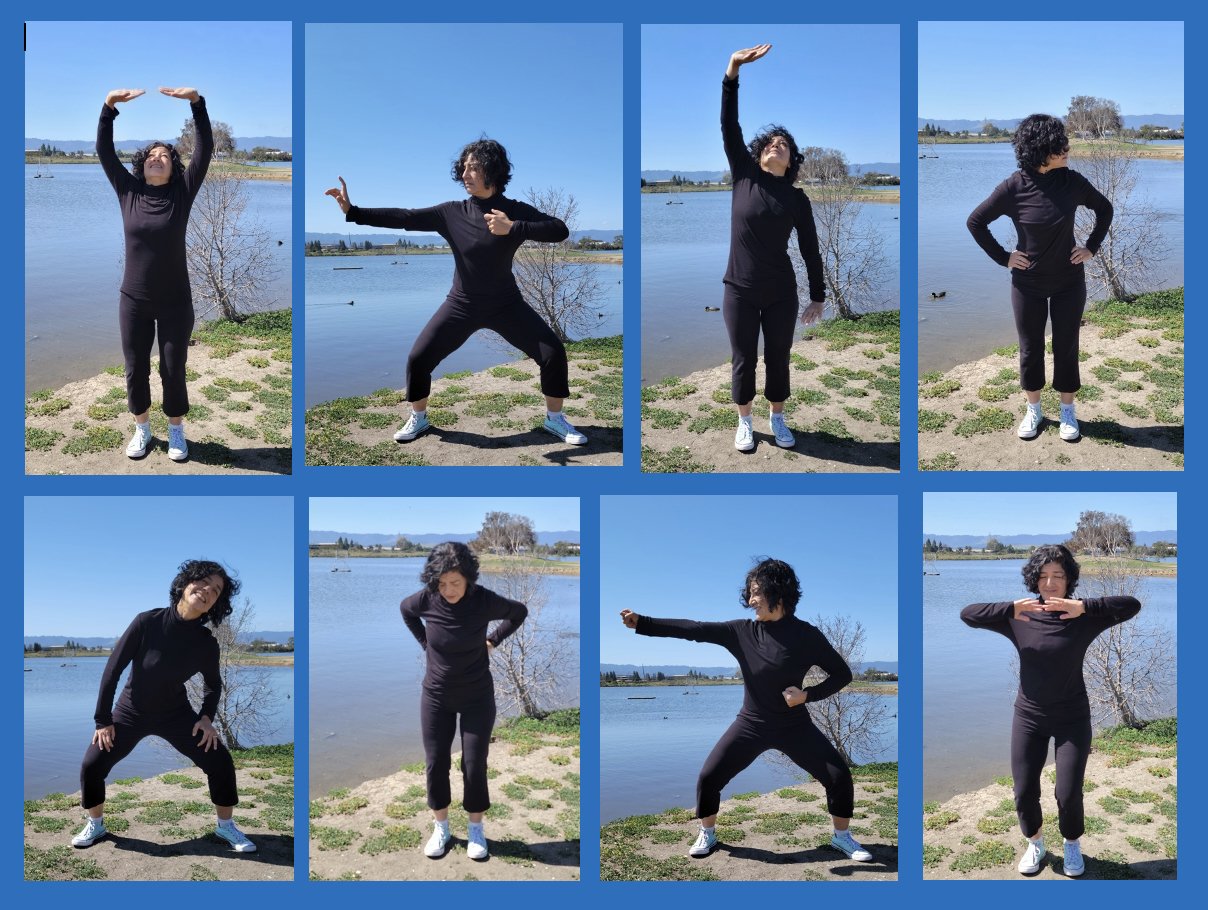Eight Reasons to do Baduanjin Eight Brocades Qigong
Baduanjin Qigong also known as Eight Brocades Qigong movements shown here in photos.
The movements are: 1. Hold up the Sky with both hands, 2. Draw the Bow, 3. Earth and Sky, 4. Wise Owl, 5. Wag Head, Wag Tail, 6 .Walk Hands up the Legs, 7. Punch, and 8. Breathe through the Heels
Baduanjin Qigong, also known as The Eight Pieces of the Brocade, is a well known set of exercises that were developed during the Song Dynasty (about 900 years ago according to some historians) in order to keep soldiers well. In modern times, Baduanjin Qigong has been widely studied by scientists and researchers who study health interventions, because it comes close to being a standard practice that is easily recognized and learned. In China, Baduanjin Qigong is said to be the practice you use to “rid yourself of 100 illnesses.” When you practice Baduanjin Qigong in earnest you weave a layer of protection around you. In Qigong, this is referred to as wei Qi, which you can think of roughly as your immune system (Yang wei qi) or the energies that you take in or don’t take in (Yin wei Qi). The idea is that you have everything you need to weave your health together to become strong and stay strong.
Eight Mental and Physical Benefits
Sets of repetitions of the eight simple movements in combination with meditative and breathing techniques can be done with no special clothing and with very little space requirements in as little as twenty minutes to ninety minutes in a single session, as shown in recent studies (see below). As a low-intensity exercise, the Baduanjin Qigong movements are easy to learn, and you can readily develop the skill to do the movements with mental focus, concentration, and breath coordination. As a mind-body exercise, Baduanjin Qigong confers physical and cognitive function benefits, including improvements in quality of life, sleep quality, balance, handgrip strength, trunk flexibility, systolic and diastolic blood pressure, and resting heart rate. Given the simplicity of its exercise routine, Baduanjin has been found to be an appropriate exercise for populations with physical or cognitive impairment. Studies have found several health benefits of Baduanjin Qigong, such as improved quality of life, physical performance, and fatigue levels in various clinical populations.
Baduanjin Qigong is a trusted health regimen
In China, Qigong is considered a sport and a health regimen, and so Baduanjin has been considered a reliable way of building health for generations. Baduanjin has been widely studied by Chinese scientists as a health practice for keeping people well, because of its simplicity, which means it is somewhat straightforward to keep faithful to its design and intent. This is important in the field of science where precision and repeatability are important features of a health practice and intervention. In scientific studies of Baduanjin Qigong, the growing scientific data confirms that the movements are safe and beneficial for you for many health challenges and abilities.
Scientific Evidence of Baduanjin Qigong’s Benefits Grows
A recent systematic review and meta-analysis (see list of references below) report the beneficial effects of Baduanin Qigong in Chinese older adults aged 65 years and older with improvements in physical function, walking ability, and balance. As the quality of studies improve, and the sample sizes increase, the studies are getting better. The evidence base continues to grow. The variety of the articles serves as a sample of what Baduanjin Qigong is thought to be good for various health challenges, and also give you a sense of the “dose” or the number of sessions that confer a benefit. I believe a single session can confer benefits, but the lasting and significant benefits occur when the practice is done consistently over a focused period of time. For now, studies range in terms of the number of practice sessions and the period of weeks that subjects practice or train during a study. For now, it is useful to make note of how Baduanjin Qigong is being studied, which ailments and illnesses are being studied, and what benefits get revealed and reported. For example, in 2024 these three studies show that Baduanjin Qigong can confer a variety of physiological benefits for diverse ailments over varying periods of time noted in number of weeks:
Restoring dexterity and fine motor skills in people with mild to moderate Parkinson’s disease over 4 weeks
Ke-Fan Li, Jun Li, A-Long Xia, Xiao-Wei Wang, Ai-Ling Wang, Ying Shi, Huai-Zhen Chen,The effects of Baduanjin on fine motor skills in mild and moderate Parkinson’s disease: A randomized controlled trial, Clinical Parkinsonism & Related Disorders, Volume 11, 2024, 100276, ISSN 2590-1125, https://doi.org/10.1016/j.prdoa.2024.100276
Alleviating vital exhaustion (measured via a questionnaire that measure dimensions of excessive fatigue, increased irritability, and feelings of demoralization) in frail adults who practiced 16 weeks
Tou, N.X., Goh, S.F., Harding, S. et al. Effectiveness of community-based Baduanjin exercise intervention for older adults with varying frailty status: a randomized controlled trial. Eur Rev Aging Phys Act 21, 28 (2024). https://doi.org/10.1186/s11556-024-00363-6
Improving postoperative pulmonary lung function in cancer patients training for 12 weeks
Xu, J., Li, X., Zeng, J. et al. Effect of Baduanjin qigong on postoperative pulmonary rehabilitation in patients with non-small cell lung cancer: a randomized controlled trial. Support Care Cancer 32, 73 (2024). https://doi.org/10.1007/s00520-023-08194-4
As the body of scientific evidence of the benefits of Baduanjin Qigong grows, it is an exciting time to learn how it is being used as a health regimen. The diversity of the studies tells a story about how Baduanjin Qigong is good for many ailments. Reading the studies for myself, my conviction that Baduanjin Qigong, like all Qigong, is a great practice, and it personally motivates me to practice more and to share this practice with others.
Other research articles of interest
Xiaoqian Wang, Jiawei Wu, Mingzhu Ye, Lecong Wang, Guohua Zheng. Effect of Baduanjin exercise on the cognitive function of middle-aged and older adults: A systematic review and meta-analysis, Complementary Therapies in Medicine, Volume 59, 2021, 102727, ISSN 0965-2299, https://doi.org/10.1016/j.ctim.2021.102727.
Jones, C., Qi, M., Xie, Z., Moyle, W., Weeks, B., & Li, P. (2022). Baduanjin Exercise for Adults Aged 65 Years and Older: A Systematic Review and Meta-Analysis of Randomized Controlled Studies. Journal of Applied Gerontology, 41(4), 1244-1256. https://doi.org/10.1177/07334648211059324
Zou, Liye, Sasaki, Jeffer Eidi, Wang, Huiru, Xiao, Zhongjun, Fang, Qun, Zhang, Mark, A Systematic Review and Meta-Analysis of Baduanjin Qigong for Health Benefits: Randomized Controlled Trials, Evidence-Based Complementary and Alternative Medicine, 2017, 4548706, 17 pages, 2017. https://doi.org/10.1155/2017/4548706
Liye Zou, Zhujun Pan, Albert Yeung, Saira Talwar, Chaoyi Wang, Yang Liu, Yankai Shu, Xiaoan Chen, and Garrett Anthony Thomas. A Review Study on the Beneficial Effects of Baduanjin. The Journal of Alternative and Complementary Medicine 2018 24:4, 324-335 https://doi.org/10.1089/acm.2017.0241
Lu Y, Qu H-Q, Chen F-Y, Li X-T, Cai L, Chen S, et al. Effect of Baduanjin Qigong exercise on cancer-related fatigue in patients with colorectal cancer undergoing chemotherapy: a randomized controlled trial. Oncol Res Treat. 2019;42(9):431–9. https://doi.org/10.1159/000501127
Zeng Z-p, Liu Y-b, Fang J, Liu Y, Luo J, Yang M. Effects of Baduanjin exercise for knee osteoarthritis: a systematic review and meta-analysis. Complement Ther Med. 2020;48:102279. https://doi.org/10.1016/j.ctim.2019.102279


